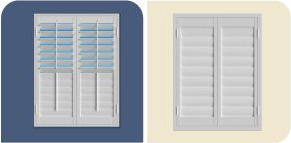
3 Ways Polywood Shutters Are Better Than Hollow Vinyl And Composite Shutters In Destin, Florida
December 15, 2015
The market for plantation shutters in Destin is full of options. And when you are figuring out which non-wood shutter fits your home best, some differences may be tough to recognize. You can easily make the wrong choice and find yourself ordering shutters that won’t last. Are solid polymer shutters, like our best-selling Polywood® shutters, worth more than composite shutters? Learn about the three ways Polywood shutters are a better choice than composite shutters in Destin, Florida so you can choose.
1. Polywood vs Composite Shutters Durability
Polywood shutters are crafted from high quality solid polymer that results in the most color-retention, durability, and rigidity than any other shutter on the market. This way, the shutter louvers won't be damaged over time. However, composite shutters are fabricated from a pressed-board core, encapsulated in poly-vinyl. The vinyl encapsulating the pressed board also peels away from the core material easily. And this peeling is expedited in wet, hot, and humid environments. Another option for non-wood shutters is hollow vinyl. But they disintegrate the fastest due to the material.Both forms of non-wood shutters are likely to warp and deteriorate when exposed to the different environmental conditions in Destin. Polywood is made with UV inhibitors that deflect heat. And because heat is the biggest problem in cracking the shutter louvers, Polywood is hands down the highest quality plantation shutter you can find.
2. Polywood vs Composite Shutters Color Fastness
Polywood shutters colors include three superior white paints. The paint finishes are baked on each component at hotter temperatures than Destin has seen. This patented finishing process uses UV inhibitors to ensure the color doesn’t fade.
Other types of non-wood shutters finishes are limited to no or low quality paint finish. In most cases, the vinyl wrap is the color you end up with. This finish may look good initially, but it fades over time. And as to hollow vinyls, some are painted. However, with the material easily conducting heat, this negatively influences the finish as time goes by.
3. Polywood vs Composite Shutters Energy Efficiency
Third party tests show that Polywood shutters block up to 30° of temperature and result in a reduction of heat transfer by up to 45%. This means that Polywood insulates up to 70% better than the top solid wood shutter.
Polywood’s insulating properties are a result of the solid polymer material. But what makes Polywood stand out even more from composite shutters is the weatherstripping on the louvers and panels. All you have to do is interlock the weatherstripping pieces while closing the panels to get an airtight seal against the effects of the weather outside. You won’t find all the energy savings that Polywood offers in any composite shutter.
Our Vegas Team’s First Hand Experience With The Durability Of Polywood Shutters
In 2004, Sunburst Shutters Las Vegas had Polywood shutters anchored to the sides of their trucks as part of the graphics. The trucks were parked outside and endured the natural elements Vegas is famous for. We’re talking intense heat for more than five months a year!
Those shutters had been on our trucks for at least 7 years at that point. Our team carried out an investigation on how well Polywood retained the color painted on it. We dusted off the Polywood shutter that was on the truck. And we compared it side by side to a new Polywood. The color hadn’t changed one bit. There was no fading or discoloration. This was further validation for our team that the Sunburst paint finish is the best in the market!
And since Polywood can endure so much abuse and heat on the side of a truck for more than 7 years, it’s hands-down the strongest shutter for your residence in Destin, Florida.


